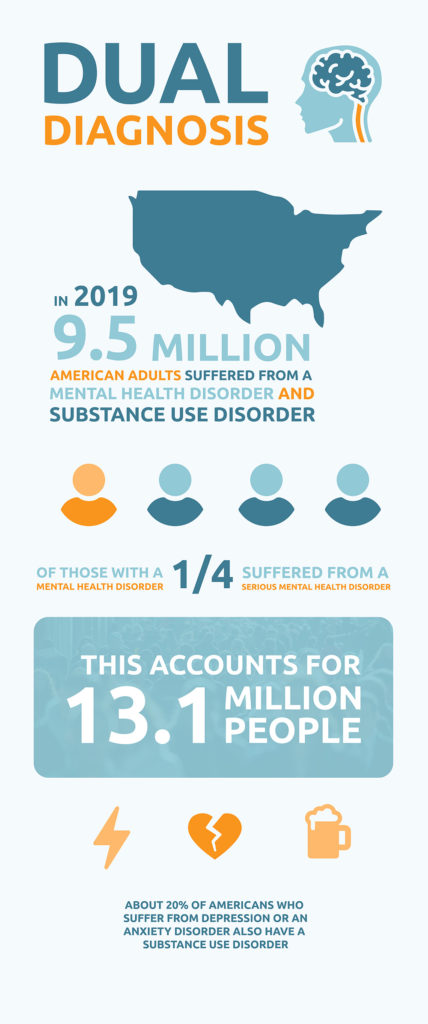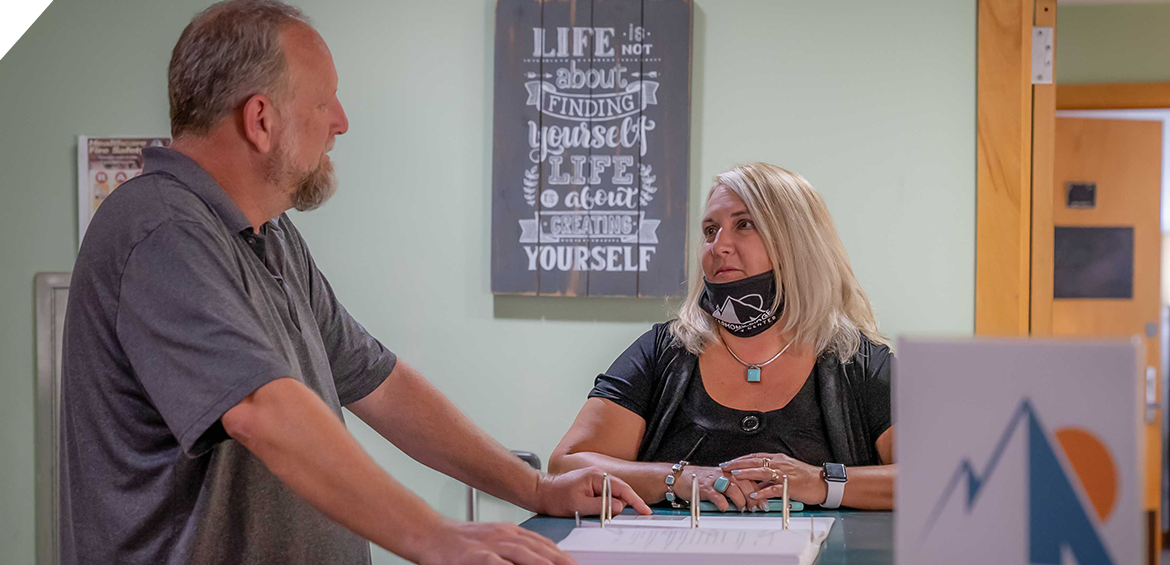Dual Diagnosis Treatment
Addiction and mental health issues often co-occur, and during substance abuse treatment, it is crucial to address both. Harmony Ridge Recovery Center in WV offers integrated treatment for dual diagnosis.
Substance use and mental health are tightly intertwined. Addiction can affect your mental state; mental or emotional suffering can drive you to addiction. It is, in fact, quite common for people with substance use disorders to also suffer from other mental illnesses. This is what we refer to as a dual diagnosis or co-occurring disorders. Typically, to recover from one you must also treat the other. It is, therefore, in your best interest to seek dual diagnosis treatment in West Virginia if you suspect your addiction might not be the only problem you are experiencing. At Harmony Ridge Recovery Center, we provide therapy for a variety of commonly co-occurring disorders as a part of addiction treatment. Our goal is for you to leave our premises happier and healthier in every way. So make the best choice for your mental health and contact us today to start your admission process.

Americans are no strangers to mental illness; almost 18 million U.S. residents have had one in the past year. Additionally, 4 million of these people deal with a coexisting drug or alcohol addiction, also known as a dual diagnosis. The sad part is that more than half of this population never received any medical treatment for either illness.
When examining someone with a dual diagnosis, it isn’t always easy to tell whether the substance abuse or mental health disorder came first. However, with the right treatment and recovery plan, people with co-occurring disorders can live healthy, sober lives. They can also gain the confidence to face their mental illness head-on and use coping skills to manage it daily.

What is Dual Diagnosis?
Dual diagnosis, also known as co-occurring disorders, is a condition characterized by two coexisting illnesses: an addiction and a mental health disorder. People who suffer from the latter are likely to self-medicate with drugs and alcohol and thus develop a drug or alcohol addiction. Vice versa, those who have an addiction can cause chemical changes in their brains and end up having behavioral health issues.
You’re at risk of developing a dual diagnosis if:
- There is a history of addiction and mental illness in your family
- You’re exposed to substances from an early age
- You’ve witnessed a traumatic event or have chronic stress/anxiety
Be aware of these risk factors before your addiction or mental health disorder gets worse. The sooner you get dual diagnosis treatment, the better.
What’s The Link Between Mental Health and Substance Use?
Excessive use of substances is quite common among the mentally ill. By some estimates, as many as half of the people who suffer from mental disorders are also addicted to drugs or alcohol. When it comes to people who suffer from substance use disorders, more than a third of alcoholics and more than half of drug abusers will receive an additional diagnosis. This is not to say that addiction necessarily causes other mental disorders or that people who suffer from mental illnesses necessarily become addicted. However, there is a correlation between the two.
What comes first – addiction or mental illness?
Because the link between addiction and mental health is not a causal one, there is no set way for symptoms to appear. You may be diagnosed with a mental illness first and then start using substances or the use of substances may cause your mental health to deteriorate. Everyone’s experience will be different. The good news is that for dual diagnosis treatment West Virginia, what comes first does not matter. What matters is that addiction and mental illness are both present and both need to be treated.
Alcohol and drugs used to self-medicate the symptoms of mental health problems
The symptoms of mental illness vary greatly and can range from mildly uncomfortable to life-altering. Unfortunately, due to the stigma that still surrounds mental health, many people are not aware that they are exhibiting symptoms, don’t realize they should seek professional help, or are not taken seriously when they do talk about their problems. This may leave them feeling alone and helpless, which causes them to turn to drugs or alcohol as a form of self-medication.

If you have used substances to cope with your mental health in the past, know that there is no shame in finding comfort where you can. However, professional treatment for mental health in the form of prescription medication and therapy will give much better results. Harmony Ridge Recovery Center can help you learn more about your condition and find healthier ways of coping.
Can addiction increase the underlying risk for mental disorders?
The question of what causes any given mental illness to develop is a complex and still under researched one. Oftentimes, there is not just one single cause behind your condition. Instead, a combination of genetic, environmental, and other factors all contribute to mental health issues. However, substance abuse can increase the risk of a mental break or exacerbate symptoms of mental illness. Furthermore, addiction can complicate your everyday life, damage your relationships, and make you feel lonely and alienated. All of this can lead to depression. Dual diagnosis treatment in WV is a way to address these issues and leave addiction behind, thus lowering the risk of reoccurring serious mental health problems in the future.
Signs and Symptoms of Co-Occurring Disorders
Even though all mental illnesses have their own unique sets of signs and symptoms, you can’t always tell if a dual diagnosis exists as well. By knowing these signs in advance, you can help your loved one get the dual diagnosis treatment they need to be sober and mindful.
You have a dual diagnosis if you show the following signs:
- Developing a tolerance to certain substances like alcohol or drugs
- Having trouble quitting drugs or alcohol
- Stealing or lying about your drug addiction and other negative behaviors
- Stopping old hobbies in favor of new friends and activities
- Feeling guilty about compulsive behaviors
- Exhibiting addictive personality traits
The following are physical symptoms of a dual diagnosis:
- A dramatic change in mood and energy levels
- Withdrawing from friends and family
- Losing interest in activities you used to enjoy
- Feeling worthless and hopeless for more than two weeks in a row
- Difficulty maintaining friendships, keeping a residence, or holding a job due to mood swings
- Having delusions or hallucinations
- Following high standards and specific rituals to relieve anxiety
Addictions That Can Be a Part of a Dual Diagnosis
Although some types of addiction are more common among the mentally ill and some mental illnesses are more frequently diagnosed in conjunction with substance use disorder, there are no hard and fast rules. As long as you have a substance problem of some kind and have been diagnosed with another disorder, you can benefit from dual diagnosis treatment in West Virginia at Harmony Ridge. We are qualified to provide:
- alcohol rehab WV
- cocaine addiction rehab
- fentanyl detox treatment
- Ambien rehab
- barbiturates rehab
- benzo rehab
- marijuana rehab West Virginia
Severe mental illness often goes hand in hand with serious addiction as well. The use of highly addictive substances like heroin and meth is not uncommon in people who suffer from illnesses like schizophrenia, PTSD, and DID. Harmony Ridge aims to provide treatment for all types of drug and alcohol addiction, which is why our facilities also include:
Common Co-Occurring Disorders
People with mental health disorders often find it challenging to deal with their painful symptoms. As a result, they’ll turn to things that give them temporary relief, most commonly drugs and alcohol. Although they’ll feel better for a little bit, those afflicted won’t find permanent solutions through substances. Below are some of the most common mental health disorders that coexist with addiction.
Anxiety Disorder
Anxiety is a general term for feelings of worry. People with anxiety disorder have overwhelming fears that make it difficult for them to maintain relationships and hold down jobs. They also tend to have panic attacks, which are episodes of severe worry
Signs and symptoms of anxiety include:
- Shaking
- Dizziness
- Paranoia
- Chest pain
- Difficulty breathing
- Nervousness
- Terror
If you have anxiety, you might feel a desire to turn to drugs and alcohol to suppress your feelings. About 10 to 20 percent of people with anxiety also struggle with substance abuse. This makes anxiety worse, however, since drugs and alcohol can make panic attacks worse.
Bipolar Disorder
Bipolar disorder, also known as manic depression, is a mood disorder characterized by extreme mood swings and shifts in behavior. People who have bipolar disorder tend to have periods of intense hyperactivity followed by severe bouts of depression. They also usually like to engage in risky behavior, which many times include abusing harmful substances. These behavioral shifts make it hard for them to hold down jobs, have families, or interact effectively with others. About 56 percent of people with bipolar disorder have also suffered from a drug or alcohol addiction at some point.
Symptoms of bipolar disorder include:
- Depression: Fatigue, loss of interest in activities you used to enjoy, suicidal thoughts, changes in appetite
- Mania: Talking rapidly, feelings of extreme self-importance, hallucinations, delusional behavior
- Hypomania: Higher-than-usual levels of energy and happiness
Depression
Major depressive disorder is one of the most common mental illnesses in the U.S., with about 10 percent of people in the country suffering from it. Although it’s normal to occasionally feel down or sad, people with depression feel this way more than usual. You might not always be able to tell at first glance if someone is depressed. Females, African Americans, and adults between ages 45 to 64 are the most at-risk for developing depression.
Symptoms of depression include:
- Loss of energy
- Anxiety
- Feelings of hopelessness or worthlessness
- Poor appetite
- Trouble concentrating
- Changes in sleeping patterns
- Attempting suicide or having suicidal thoughts
Depression is commonly known as a gateway to drug and alcohol abuse. Those afflicted will turn to substances to numb their pain and mask their true feelings.
Eating Disorders
Eating disorders afflict 24 million people in the U.S. in each age group, and only about 10 percent of people with these disorders get any treatment for them. Some of the more common eating disorders include anorexia, bulimia, binge-eating, and pica.
Although each eating disorder has slightly different signs and symptoms, they are all pretty similar:
- Binge-eating (eating large amounts of food quickly)
- Purging (forcing themselves to vomit, use laxatives or exercise excessively)
- Having a distorted body image
- Low self-esteem
- Feelings of guilt for eating too much
- Secretive about eating habits
- Mouth sores
- Dry skin
- Swollen salivary glands
Obsessive-Compulsive Disorder (OCD)
Obsessive-compulsive disorder is categorized as an anxiety disorder. People with OCD have recurring fears and thoughts that cause extreme worry. By practicing rituals and frequently counting objects, they’ll find relief for a short while. However, their fears will soon come back.
More than 25 percent of people with OCD also struggle with substance use disorder.
Signs and symptoms of OCD include:
- Fear of germs or being exposed to bacteria
- Intrusive and disturbing thoughts and images
- Obsession with numbers, cleaning, and counting
- Fixation on religion
Borderline Personality Disorder (BPD)
People with BPD have difficulty regulating their emotions and forming lasting relationships. BPD distorts a person’s self-perception, and they react dramatically to situations to cope with troubling feelings.
Symptoms of BPD include:
- Mood instability
- Paranoia
- Difficulty controlling emotions
- Trying to avoid abandonment
- Suicidal behavior
Post-Traumatic Stress Disorder (PTSD)
Post-traumatic stress disorder can be extremely debilitating. PTSD can cause extreme anxiety and frightening flashbacks in people who have served in combat or been through a traumatic childhood event. If you experience trauma, you might feel out of control and powerless. This disorder greatly interferes with everyday responsibilities and can come in between your relationships.
A few causes of PTSD are:
- Sexual assault
- Violent assault
- Military combat
- Childhood abuse
- Natural disasters
The stress and panic attacks that stem from PTSD can drive someone to abuse alcohol or drugs and eventually develop an addiction.
Schizophrenia
Schizophrenia is a complex mental illness that revolves around hallucinations, disorganized speech, and delusions. It also consists of manic episodes that can include depression. People with schizophrenia tend to be alone and isolate themselves, which can take them down a dark path to addiction.
The Importance of Treating Co-Occurring Disorders Together
If you have co-occurring disorders, they must be treated simultaneously. An inpatient rehab program will be your best option since you’re suffering from two major health conditions. When you’re in an inpatient program, you’ll receive intense, round-the-clock care. When a dual diagnosis is treated as one, doctors will be better able to determine the causes of both your addiction and your mental illness.
Dual Diagnosis Treatment at Harmony Ridge Recovery Center
At Harmony Ridge, we understand that patients undergoing dual diagnosis treatment require special care and attention. Having two disorders at the same time is not easy to handle, but you can put your faith in us. We offer a comprehensive approach to dual diagnosis treatment, and we know that there is no one right solution for everybody. Each program we design is tailored to our patients.
Detox
Medical detox is an important first step on the road to recovery. During a detox, you’ll stop using substances like drugs or alcohol while their harmful toxins leave your body. This can take as long as 30 days, and medical professionals will supervise you. You’ll likely have painful symptoms of withdrawal like nausea and dizziness, and our staff can mitigate these with medication.
Residential Treatment
After you’ve gone through detox, you’ll be immersed in therapy and addiction treatment. Residential treatment is our most restrictive program where you’ll receive 24/7 care and supervision in a serene, safe environment. Our licensed staff is trained to give you the best care and help you bond with other patients going through dual diagnosis treatment.
Partial Hospitalization Program
Partial hospitalization programs (PHPs) are a step down from residential treatment. Patients in our PHP will attend treatment three to five days a week for four to six hours per day. Like outpatient treatment, PHPs allow members to live at home while in recovery, but it does require more attendance than an outpatient program.
Intensive Outpatient (IOP)
Our more relaxed treatment program, intensive outpatient is for people with mild addiction and mental health symptoms. If you reside in a safe and supportive environment and need to go to work or school, IOP is the best option for you. IOP patients attend three-hour sessions three days a week, and treatment usually lasts about three to four months.
Therapy
Therapy is key to a successful recovery from dual diagnosis. While detox treats our bodies, therapy treats our minds and souls. You likely have unresolved issues stemming from your mental illness and your addiction. By talking to your therapist, you can learn new ways to tackle problems and understand what led you to abuse drugs and alcohol.
Individual Therapy
Individual therapy sessions will give you one-on-one time with your therapist. You’ll talk about how your mental illness came about, as well as what negative behaviors and thoughts led to your addiction. Using cognitive behavioral therapy, your counselor will turn these negative thoughts into positive ones that will help you reach your mental health goals. He or she will also help you identify triggers that can set off relapse or symptoms of mental illness.
Group Therapy
Patients in group therapy will be surrounded by others who also have a dual diagnosis. Guided by a trained therapist, each person will get a chance to share their experiences living with co-occurring disorders. Your therapist will also teach you coping skills and initiate roleplaying so that you can apply what you’ve learned to everyday situations.
Family Therapy
Family therapy aims to repair the bonds you’ve severed with your loved ones while under the influence of drugs and alcohol. Both your addiction and mental illness can take a toll on your family members when you’re suffering. By understanding your co-occurring disorders, your family can support you and provide you with a safe environment.
Aftercare
Now that you no longer need drugs or alcohol to function, you might think you’re out of the woods. However, you’ll still encounter triggers and cravings which could lead to relapse. Aftercare is essential for preventing this from happening, and it will also help you conquer your mental illness for the long term.
Aftercare services like art therapy, outdoor therapy, meditation, yoga, and holistic services like acupuncture and tai chi can all bring you closer to peace. Learning how to live life sober can be an exciting experience, and this is an important time for you to find yourself. With proper aftercare, you can learn how to handle your dual diagnosis safely and responsibly.
The Challenges of Dual Diagnosis Treatment West Virginia
Treatment is not always straightforward for either addiction or any of the co-occurring mental disorders. Recovery is further complicated by the fact that addiction and mental illness have an effect on each other. Treating addiction only, for example, can be futile if addiction is a consequence of an underlying condition that is left unaddressed. Similarly, treating only the mental health problem will still leave the individual addicted to substances. To be successful, dual diagnosis treatment in WV must, therefore, address both diagnoses simultaneously while acknowledging the ways in which they are mutually dependent.

The importance of therapy in rehab
Drug and alcohol treatment at Harmony Ridge always includes regular sessions of addiction therapy WV. While medication can help with the physical symptoms of detox and even diminish cravings, therapy is there to address the mental and emotional aspects of recovery. It is, therefore, even more important for dual diagnosis treatment West Virginia when another mental illness is at play. Therapy can look different for everyone. Depending on your condition, personality, and even sheer preference, you may benefit more from:
- group therapy for addiction – discussing your addiction and mental health in a group setting is a great way to practice communication, connect with others in a similar situation, build a support network, and combat feelings of loneliness or isolation
- individual therapy for addiction – one-on-one sessions with a mental health specialist will give you the expert perspective on your condition and teach you how best to cope with your symptoms
Both individual and group therapy are available at Harmony Ridge. A combination of both typically gives the best results for co-occurring disorders.
Does alternative therapy help?
Because dual diagnosis treatment in WV is so complex, trying out different types of therapy may be necessary to find the right solution for your unique mental health issues. Sometimes, alternative forms of treatment provide the best results. So don’t shy away from the less common forms of therapy that we offer – you’d be surprised at how effective they can be! If traditional talk therapy is not working for you, you may want to try:
- EMDR therapy for drug addiction – eye-movement desensitization and reprocessing therapy is based on scientific findings that eye movement patterns and impulse decisions are related; it trains the brain out of addiction by severing the connection between certain eye movement patterns and the desire to use substances
- cognitive behavioral therapy for substance use disorders – CBT aims to uncover the thought patterns that lead to undesirable behaviors (such as substance abuse) and then change them
- art therapy rehabilitation – expressing yourself creatively through art can be beneficial for your overall mental health by distracting you from everyday stress and giving you an outlet for your feelings
- holistic therapy for addiction – by addressing your mental, emotional, and physical well-being together through a combination of different types of therapy, physical activity, nutrition, and social activities, the holistic approach to treatment aims to reduce the appeal of substance use and encourage healthier living
Inpatient vs Outpatient Program - Which Approach is Better For Dual Diagnosis Treatment West Virginia?
The main difference between inpatient and outpatient programs is the environment you spend most of your time in:
- During inpatient drug rehab in WV, you will stay at our facility. This puts you in a controlled environment and under 24/7 medical supervision. You will have a stricter daily routine than you would at home. The opportunity to use drugs is removed as substances are not allowed on the premises.
- If you choose an intensive outpatient program West Virginia, you will continue to live in the comfort of your home. This way, you have access to your own support network in the form of family and friends. Meanwhile, you will attend therapy sessions at our facility several times a week.
Dual diagnosis treatment in WV can be done as an inpatient or outpatient program. Each comes with its own benefits and its own drawbacks. What works for you will depend on the severity of your condition – typically, inpatient programs are more suitable for severe mental disorders and serious cases of addiction while the less intense outpatient programs are used to treat milder conditions.
Population-specific considerations for dual diagnosis treatment in WV
Harmony Ridge practices an individualized approach to treatment. This means that rehab is tailored to each person’s specific needs. Your road to recovery will, therefore, greatly depend on who you are as a person and where in life you find yourself to be. This is why we take demographics into consideration when planning your treatment.
Treatment programs for veterans with co-occurring disorders
Both substance use disorder and various commonly co-occurring disorders (like depression, anxiety, PTSD, and OCD) are more prevalent among veterans than the general population. If you are a vet who struggles with addiction, odds are that you could benefit from dual diagnosis treatment West Virginia at Harmony Ridge. We provide rehab for veterans led by specialists who are sensitive to the unique experiences of soldiers and the consequences those experiences can have on mental health.

Dual diagnosis treatment for adolescents and young adults
Teens and young adults are among the populations most at risk to develop mental health problems and substance use disorders. At this age, before the brain is even fully formed, impulse control tends to be lower. Peer pressure, hormonal changes, and intense emotions can make it even harder to resist the temptation to use drugs and alcohol. Unfortunately, this is also an impressionable age. Something that starts out as an experiment may turn into a lifelong habit. To further complicate things, many mental disorders begin to exhibit symptoms during this time as well. This is why rehab for young adults in WV is so important. Timely treatment can turn your life around at this age.
If you are young and worried that you may suffer from co-occurring disorders, seek help now. Our staff won’t dismiss your concerns because of your age. We understand that life can be hard when you are still figuring things out and we won’t judge you for the mistakes you may have made along the way.
Dual diagnosis and denial
There is a reason why we say that realizing you have a problem is the first step to finding a solution. Many people find it hard to admit that they struggle with mental health or addiction. There is too much stigma and misinformation surrounding mental disorders; this causes many people to outright deny they have a problem rather than risk being judged if they admit to it. Denial or a lack of awareness of mental illness is common in those with a dual diagnosis. You may be in denial about the mental disorder, the addiction, or both. But until you recognize you have a problem, you cannot seek treatment for it.

Harmony Ridge fosters a respectful, caring, and non-judgmental atmosphere. No matter what condition you may suffer from, you are welcome at our facility. Don’t be afraid to reach out to us. We are here to help you.
Self-help for a dual diagnosis
A part of dual diagnosis treatment West Virginia is learning healthy coping mechanisms. These help you manage the symptoms of your condition without turning to substances. A therapist who specializes in your diagnosis is the best person to help you with this. You will achieve the most improvement through professional treatment. If you are, however, momentarily unable to join one of our programs, there are steps you can take by yourself to make your condition more manageable:
- Learn how to manage your emotions. You are likely to turn to substances when you are experiencing a lot of high-intensity emotions that you don’t know how to deal with. Try identifying and addressing the emotion instead. Name what you are feeling, out loud if it helps. Then consider what you can channel that feeling into. Here are a few examples: if you are feeling anxious, try showering or practicing self-care; when you are angry, go to the gym to expend energy; let yourself cry when you are upset.
- Establish meaningful connections. Addiction and mental illness are often isolating. To remind yourself that you are not alone, it can be helpful to surround yourself with people you care about and who care about you. If you feel up to it, talk to them about your struggles.
- Make changes to your lifestyle. Unhealthy coping mechanisms establish themselves through repetition. So changing things about your routine can make a big difference. Try exercising or finding a new hobby for an easy lifestyle change; consider a new job or relocation for a bigger impact.
- Find new meaning in life. You need something to drive you forward. This can be a new goal in life, a new relationship, religion, or anything else that motivates you.
Dual Diagnosis Treatment is Only A Phone Call Away
Are you suffering from drug addiction and a mental health disorder? It’s not too late for you to seek help. Harmony Ridge Recovery Center can bring light to the dark path you’ve been on for so long. Don’t give up hope now! Contact us today to learn about how we can treat your dual diagnosis and how you can take control of your mental health.
Additional Resources:
Supporting Your Loved One Through Dual Diagnosis Treatment West Virginia
Do you suspect that someone you love is suffering from mental illness and substance abuse? If so, broach the subject carefully. Remember that your friend or family member may be in denial about their condition. Or, if they realize they have a problem, they may be afraid of your reaction to knowing about it. It is vital that you be understanding and supportive. Be clear and explicit when you tell your loved one that you care about them and only want to help them.

It is important that you do not force treatment on your loved one before they are ready. This will only make them defensive and may even delay their decision to accept help. Instead, try to casually bring up dual diagnosis treatment in WV. Explain why you think your loved one would benefit from it and suggest some resources they can look into.
When they feel up to it, you can find rehab programs for your loved one at Harmony Ridge. To show your support, help your friend or family member through the admission process, preparation, and check-in. If they agree to it, you can also participate in family therapy with them. Most importantly, accept and support your loved one throughout the process without judgment even if you don’t always understand or agree with their decisions.
Reasons to Choose The Experts for Dual Diagnosis Treatment WV at Harmony Ridge
Harmony Ridge Recovery Center is one of the leading addiction treatment centers in the state. Our modern facilities come with a wide variety of amenities including fully furnished rooms, spacious common areas, a gym, an outdoor seating area, and more. Thanks to our unique location, we also have access to more than 50 acres of beautiful nature where you can go hiking, biking, fishing, or even camping. The complex for a comfortable recovery in a calming and peaceful environment.
We focus on evidence-based treatment for substance use disorders and other mental illnesses. Our team consists of compassionate and caring mental health professionals who all have personal experiences with addiction. It is our philosophy to treat everyone who walks through our door with respect and dignity as we set them on the path to sobriety. We understand you are a unique individual with unique symptoms, problems, and motivations; that is why we tailor the program to your needs. At Harmony Ridge, you will receive a highly personalized treatment plan designed especially for you to maximize your chances of a permanently successful rehab.
Starting Your Dual Diagnosis Treatment at Harmony Ridge
If you need dual diagnosis treatment in West Virginia or you know someone who does, do not hesitate to contact us. We are available 24/7 to help you overcome addiction and set you on a better path. As one of the best rehab centers in the country, Harmony Ridge Recovery Center is the best choice you can make for your mental health and sobriety.
FAQ
1. What is a dual diagnosis?
If you struggle with addiction and suffer from another mental disorder such as depression or OCD, your condition is referred to as a dual diagnosis. Another name for this condition is co-occurring disorders, because two (or more) mental disorders occur simultaneously in one patient.
2. What are the most common co-occurring disorders in addicts?
Substance use disorder is most frequently diagnosed in conjunction with anxiety, depression, eating disorders, PTSD, OCD, bipolar disorder, borderline personality disorder, and schizophrenia.
3. How will I know if I have a dual diagnosis?
You have co-occurring disorders if you exhibit symptoms of two or more mental illnesses. Since many of the disorders that correlate with addiction have similar symptoms, it is best to discuss your condition with a professional. Make sure to bring up any diagnoses you may have previously received.
4. What is the best approach to treating a dual diagnosis?
When it comes to addiction and mental illness, the two conditions are typically linked. It is, therefore, necessary to treat both together. Different forms of therapy administered during rehab are an effective way to do this.
5. How do I cope with my underlying condition after rehab?
Rehab can help you recover from addiction and learn healthy coping mechanisms, which can, in turn, alleviate the symptoms of other mental illnesses. However, sobriety won’t necessarily cure your mental illness. You may, therefore, still struggle the co-occurring disorders like anxiety, OCD, and bipolar after rehab. These can be treated with medication and continued therapy.
Jump To Section
Begin Your Journey to Healing Here
Ask me about recovery, I can help you!
Our recovery specialists are standing by 24/7 to help you or your loved one.
Or call us: 






